veterans' bonus certificates
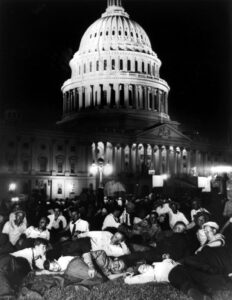
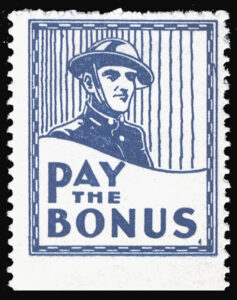 Following their service in World War I, veterans were given a veterans’ bonus certificates…basically an I.O.U. from the government. When the Great Depression hit, and many veterans were out of work, the certificates became essentially worthless…at least for the time being. That was unacceptable to the veterans, who had been promised a bonus, and now they really needed it.
Following their service in World War I, veterans were given a veterans’ bonus certificates…basically an I.O.U. from the government. When the Great Depression hit, and many veterans were out of work, the certificates became essentially worthless…at least for the time being. That was unacceptable to the veterans, who had been promised a bonus, and now they really needed it.
As you would expect, telling people that the money they need today, will be coming to them down the road…eventually, is not going to go over well. In May, the so-called “Bonus Expeditionary Force,” a group of some 1,000 World War I veterans seeking cash payments for their veterans’ bonus certificates arrived in Washington DC. These men were unemployed and desperate. So began the protests by the “Bonus Marchers.” Most of the marchers were in 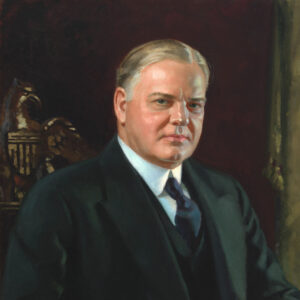 financial straits, and they were either going to get paid, or they were going to go under. That was unacceptable for these loyal veterans, who felt that they were getting a bum deal. In June, more veteran groups spontaneously made their way to the nation’s capital, bringing the Bonus Marchers to nearly 20,000 strong. They were camping in vacant government buildings and in open fields made available by District of Columbia Police Chief Pelham D Glassford. The Bonus Marchers were demanding passage of the veterans’ payment bill introduced by Representative Wright Patman, and they wanted it passed now.
financial straits, and they were either going to get paid, or they were going to go under. That was unacceptable for these loyal veterans, who felt that they were getting a bum deal. In June, more veteran groups spontaneously made their way to the nation’s capital, bringing the Bonus Marchers to nearly 20,000 strong. They were camping in vacant government buildings and in open fields made available by District of Columbia Police Chief Pelham D Glassford. The Bonus Marchers were demanding passage of the veterans’ payment bill introduced by Representative Wright Patman, and they wanted it passed now.
To their credit, the veterans conducted themselves in an orderly and peaceful fashion as they waited for the vote. Finally, on June 15 the Patman bill passed in the House of Representatives. Unfortunately, two days later, it was defeated in the Senate, and the marchers were furious. They refused to leave the area. The government was trying to defuse the situation and clear the area, so they agreed to provide money for the protesters’ trip home, but 2,000 protesters refused 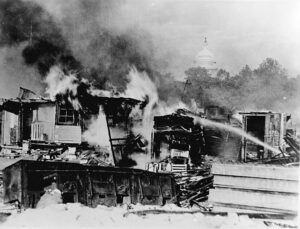
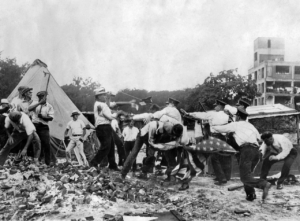 the offer and continued to protest. Then, on July 28, President Herbert Hoover ordered the army to evict them forcibly. It was an order that would not end well. General MacArthur’s men set the protesters’ camps on fire, and the veterans were forced to leave the city. Hoover was increasingly regarded as insensitive to the needs of the nation’s many poor. He was strongly criticized by the public and press for the severity of his response.
the offer and continued to protest. Then, on July 28, President Herbert Hoover ordered the army to evict them forcibly. It was an order that would not end well. General MacArthur’s men set the protesters’ camps on fire, and the veterans were forced to leave the city. Hoover was increasingly regarded as insensitive to the needs of the nation’s many poor. He was strongly criticized by the public and press for the severity of his response.

